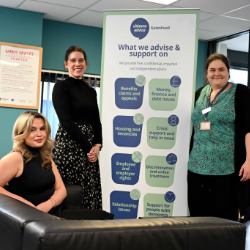Report calls on the UK banking industry to consider interventions that "design out" economic abuse
Researchers have published the findings of a ground-breaking study which brought together victim-survivors…
International
Northumbria’s global footprint touches every continent across the world, through our global partnerships across 17 institutions in 10 countries, to our 277,000 strong alumni community and 150 recruitment partners – we prepare our students for the challenges of tomorrow. Discover more about how to join Northumbria’s global family or our partnerships.
View our Global FootprintBusiness
The world is changing faster than ever before. The future is there to be won by organisations who find ways to turn today's possibilities into tomorrows competitive edge. In a connected world, collaboration can be the key to success.
More on our Business ServicesResearch
Northumbria is a research-rich, business-focused, professional university with a global reputation for academic quality. We conduct ground-breaking research that is responsive to the science & technology, health & well being, economic and social and arts & cultural needs for the communities
Discover more about our ResearchAlumni
Northumbria University is renowned for the calibre of its business-ready graduates. Our alumni network has over 253,000 graduates based in 178 countries worldwide in a range of sectors, our alumni are making a real impact on the world.
Our AlumniWhen considering whether or not to go to university you’ll likely be asking yourself –
Read on for answers to these questions and the benefits of higher education to employability.
There are more options than ever to get into a career, from starting your own business to joining an apprenticeship. You should choose the path that suits you best but know that one thing hasn’t changed: the key employability skills that you’ll develop in higher education continue to be in high demand from employers.
Consider also that a Department for Education study showed that graduates earn more on average than those who did not go to university.
To really maximise your employability, you need to demonstrate a combination of knowledge, skills, and experience. You’ll need to take advantage of opportunities, resources, and tools available during your time in education to develop personally and professionally.
Here are seven ways that attending university can improve your employability.
University provides you with a strong foundation of knowledge…
The subject knowledge you’ll gain at university is, of course, beneficial to your career after leaving higher education. If you hope to become an architect for example, or a computer programmer then a thorough understanding of that subject area is paramount to entering a career in the field.
Applying your knowledge...
Studying at university develops your key employability skills as well as subject knowledge. These skills will give you the ability to practically apply your knowledge to a specific situation, this is invaluable in the workplace and will make you more employable.
You might see these skills labelled as ‘soft skills’ or ‘transferable skills’ but along with technical knowledge and understanding they build a picture of a good employee and a well-rounded person.
At university you’ll become analytical, and you’ll develop an adaptable approach to working, critical thinking, responsiveness and many other traits that are valuable in and out of employment.
Whilst you develop your knowledge at university through participating in lectures, seminars, presentations, carrying out research, writing reports, and organising your studies you’ll also be developing those softer, transferable skills too.
University is a great opportunity to develop your communication...
When considering whether higher education can make you more employable you should also consider the social skills you’ll develop whilst at university.
Meeting new people, experiencing, and adapting to new environments and cultures, communicating effectively, and trying new things are all key employability skills that you’ll be exposed to at university, some of which you might even experience as early as your first day on campus!
Discover a new hobby and develop your leadership...
Universities tend to have hundreds of clubs, societies, and teams you can try out. Trying out a new hobby sounds like fun (and it is!) but university clubs and societies also give you access to new experiences and strengths.
Further to trying something new, you could choose to take an active role in the organisation of your society gaining practical experience in things like managing finances, event planning, committee membership and organisation.
These snippets of experience could set you apart from other candidates for jobs after university. UCAS recently shared that 17% of employed people in our recent graduate survey said that extra-curricular activities they took part in directly helped them get a job.
As well as skills and knowledge your career after university may depend on your experience in your chosen field. In highly competitive job markets the thing that helps set candidates apart is their experience of doing the job or evidence to show understanding of the role and sector.
This sort of experience can be hard to get, especially if you’re doing it alone. Find out what support is on offer from the Northumbria University Graduate Futures Service.
Northumbria University is heavily linked with industry through research, enterprise, and other partnerships. You’ll find that there are lots of subjects which offer a year in industry. These sandwich degrees are structured with undergraduate employability in mind and are designed to include work placements that help to optimise your skills, knowledge, and experience.
Universities don’t just provide access to industry partners through placements and work experience. They also facilitate connections with the people in those industries.
Northumbria hosts careers fairs and networking events where you can meet and speak to professionals doing the jobs you want. These events are great opportunities to develop a network of contacts. Connecting with influential people in the field that you’re interested in can help when you establish a career after university.
We also have an established and engaged alumni network. Ask your course leader for details on who is willing to meet with, mentor or support you. After all, hearing first-hand success stories can be a real source of motivation, another key employability skill.
The networks, connections, and opportunities you’ll access at university can inspire confidence and agency when navigating your career after university.
So, do employers care about university when looking for applicants? For the most part, yes.
However, learning and developing yourself to further your career after university doesn’t stop once you complete your undergraduate degree. Further education might take the form of further studies like a Masters or PhD. Or, in the world of work, through continued professional development from your employer.
Attending and succeeding at university shows a commitment to learning that companies value – accepting that you always have more to learn can be even more valuable and ensure you continue to progress professionally and intellectually.
If you want to achieve success in your chosen field, make sure you get the most out of your education. Whether you’re thinking about going to university, a recent graduate, or someone who studied years ago and wants to refresh their knowledge, there’s always something to learn.
Investing in a degree and the key employability skills that higher education support can help you succeed in the workplace and in life.

Researchers have published the findings of a ground-breaking study which brought together victim-survivors…
.png?modified=20251222122622)
A Northumbria University research project has been highly commended at the 2025 Green Gown…

Northumbria University has been rated as ‘1st class’ for sustainability and is once again the…

A Northumbria University academic is leading pioneering training to support police forces across…

Northumbria University has launched the Hopeful Futures AI Challenge, a groundbreaking national…

Following the success of a Law in the Community project, Northumbria University is expanding…

The North East Space Communications Accelerator (NESCA) has successfully awarded its first…

The inaugural cohort of Civil Engineering degree apprentices have graduated from Northumbria…

City Campus East, Northumbria University CCE1-403
-

Virtual Workshop
-

Northumbria University

Northumbria University
-



